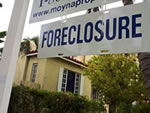Foreclosures
FORECLOSURE NEWS ITEMS
Most Americans thumbs down on 'strategic defaults'
by Broderick Perkins
The fallout you can expect from walking away from home ownership could include the ire of your neighbors.

Even if you are 'underwater' -- owing more on your mortgage than your home is worth -- there's rarely a good reason to stop paying your mortgage, according to a majority of Americans.
A new FindLaw.com survey says 60 percent of Americans believe that it is "never OK" for homeowners to simply stop making payments on their mortgages.
Another 34 percent said walking away, called a "strategic default," is OK for homeowners, but only if they aren't able to make the monthly payments.
Only 3 percent said home owners should be able to walk away from mortgages anytime they want.
Tossing the door keys in the circular file and stopping mortgage payments will eventually lead to foreclosure, but that's not all. Unanticipated consequences could include tax problems, contractual issues, damage to your credit and credit scores, damage to your ability to borrow in the future, even a lawsuit.
"Many homeowners are currently facing very difficult and complicated situations involving their home mortgage, in some cases even including the threat of foreclosure," said Stephanie Rahlfs, an attorney and editor for FindLaw.com.
"But before making any major decisions, homeowners should consult with financial and legal professionals, including accountants, real estate attorneys and financial advisers," Rahlfs added.
She also said, "Various government programs and tax changes involving mortgages have been enacted since the beginning of the housing crisis. Combined with private programs and variations in state laws, it creates a complicated web of potential actions available to homeowners."
FindLaw.com advises consumers not to play Ostrich, but, at the first signs of financial trouble, to seek help from counselors, community and social organizations and your lender or servicer. Examine all the alternatives before bailing on homeownership.
They include:
• Refinance. If you qualify, turn your existing mortgage for a new one. If you have a mortgage that is underwater, this could be the toughest option to accomplish. However, federal programs, including the Federal Housing Administration's refinance effort, can be a good bet for those who haven't yet faced hardship and can qualify for a new loan.
• Mortgage modification. A mortgage modification reworks the terms of your existing loan to get the payment down to a more affordable level. To add greater affordability, lenders lower the mortgage interest rate, lengthen the term of the loan or reduce the principal -- or do some combination of all three.
• Short sale. A short sale occurs when the bank allows the sale of your home for less than the existing mortgage balance, typically, provided there's a qualified buyer in the wings.
• Deed-in-lieu-of-foreclosure. With this option, you hand over the property to the bank for resale. Some short sales and deed-in-lieu of deals qualify for the government sponsored Home Affordable Foreclosure Alternatives (HAFA) deal -- the lender or servicers can't request any cash from the home owner, require a promissory note or pursue any deficiency judgments.
• Bankruptcy. Bankruptcy is a court-based process that can give you a financial "fresh start" by getting you out from under burdensome debts. Once the bankruptcy process is complete, you typically are released from personal liability for most debts.
• Reinstatement, repayment Plans and forbearance Plans. These plans help you get current on their mortgage when you have temporary financial problems. Talk with your lender or loan servicer for details.
More Related Articles:
Mortgage defaults rose by one-third in August
Chase offers mortgage counseling to troubled consumers
Could you qualify for a 'Qualified Residential Mortgage?'
Foreclosure assistance comes to California
Bankruptcy counseling helps cure debt addiction
Freddie Mac losses narrow as consumers make more mortgage payment

